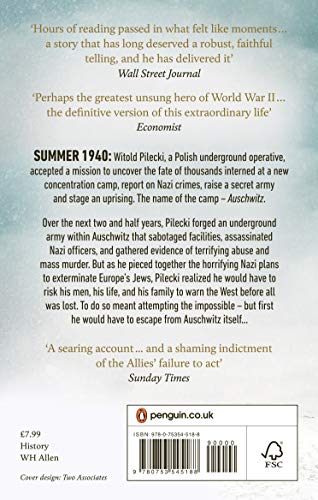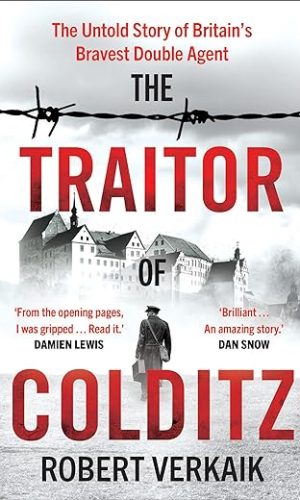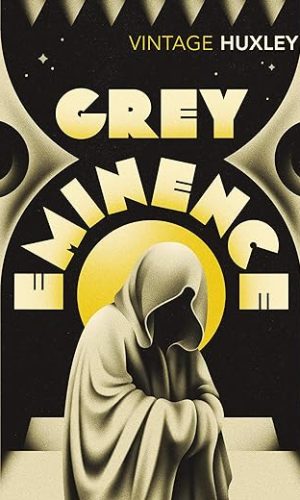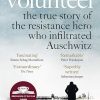The Volunteer: The True Story of the Resistance Hero who Infiltrated Auschwitz – Costa Book of the Year 2019
£10.40£12.30 (-15%)
One of the Sunday Times paperbacks of the Year 2020
One of the Financial Times best books of 2020
‘Totally gripping’– Simon Sebag Montefiore
‘Pilecki is perhaps one of the greatest unsung heroes of the second world war … this insightful book is likely to be the definitive version of this extraordinary life’ — Economist
Would you sacrifice yourself to save thousands of others?
In the Summer of 1940, after the Nazi occupation of Poland, an underground operative called Witold Pilecki accepted a mission to uncover the fate of thousands of people being interned at a new concentration camp on the border of the Reich.
His mission was to report on Nazi crimes and raise a secret army to stage an uprising. The name of the detention centre — Auschwitz.
It was only after arriving at the camp that he started to discover the Nazi’s terrifying plans. Over the next two and half years, Witold forged an underground army that smuggled evidence of Nazi atrocities out of Auschwitz. His reports from the camp were to shape the Allies response to the Holocaust – yet his story was all but forgotten for decades.
This is the first major account to draw on unpublished family papers, newly released archival documents and exclusive interviews with surviving resistance fighters to show how he brought the fight to the Nazis at the heart of their evil designs.
The result is an enthralling story of resistance and heroism against the most horrific circumstances, and one man’s attempt to change the course of history.
Read more
Additional information
| Publisher | 1st edition (9 Jan. 2020), WH Allen |
|---|---|
| Language | English |
| Paperback | 528 pages |
| ISBN-10 | 0753545187 |
| ISBN-13 | 978-0753545188 |
| Dimensions | 12.7 x 3.2 x 19.8 cm |











by alex parry
Tugs at the heartstrings. Shows the true cost of war
by wd
This is a very thought provaking book, and takes us back to the war many years ago, its very well written and takes you to the time and gets you in the frame that you can see what’s happening. The cruel treatment the polish, german, russian jews were given and how this brave man volunteered to be taken prisoner so he could report back to the european goverments of the ill treatment and the killing going on from these camps by the germans. How the prisoners were used for experimental surgery and drugs. This makes me so mad that even though the goverments were made aware of the treatment deaths taking place in these camps, due to the figures they though it was a mistake and couldn’t be true so no rescue mission were made to rescue these prisoners that turned the prisoners to turn on each other to keep themselves alive. This should never be forgotten on how the Germans treated these men, women and children, how can you willingly kill these people, yes there was a war on but to rob them of all there valuables, kill them then keep the clothes and shoes etc, bury then naked with no diginty at all disgusting, and to know that some of those that carried out this treatment some of them never got the punishment they deserved after the war. These resistance people were very brave, and some of the polish germans, that hid the resistance and provided some food and water. Its a very provoking book and was in tears throughout a few stages of this book. I think schools should be teaching our children about this horror, rather than trying to rewrite history and remove this from the curriculum as though it never happened. Even in war people don’t deserve to be treated this way?
by strangefruit
This is a story of the Polish view of Auschwitz prison camp during World War 2. The Story of Witold, a very patriotic pole trying to make sense of the senseless killing machine that was growing up around him and trying in vain also to alert the Polish, UK and American governments of the horrors that Nazi regime were perpetrating.
There is an energy in the book and within Witold himself that keeps the action moving from page to page, whether that be the numerous atrocities at the camp and elsewhere, or Witolds own fearless charge from one fight to another to save the Polish people. It seems Polish people and the West in general were determined to sideline or hide the ongoing Holocaust till after the war. Antisemitism was rife across the land and Polish nationalism also fed into that stream. Witold, although sympathetic and supportive to Jewish individuals he encountered on his path could not bring himself to feel passionate about the fate of the Jewish population at large. The author Jack Fairweather does talk about Polish Antisemitism and Witold’s weakness. The Polish prisoners were treated, although harshly, much better than the Jewish population at the camp, mostly being given Kapo positions of status, often colluding with the SS activities. To look to the real nature of Auschwitz is to look at the Jews treatment on the camp, which Witold only talks about in passing. The Author doe swell in including this aspect of the Poles and is quite objective in his telling of the story. Jack also does write quite fully on the development of the camp complex from it’s creation and that aspect was fascinating. Also it was instructive to note that Witold himself thought the Communist occupation torture of him after arrest as underground activism “made Auschwitz seem like a playground in comparison”. A war comes along and it makes a hero of certain people. Witold was one of those people, for all his faults. Poland are lucky to have him and his writings as an example.
by Lauren
“So long as the prisoners could believe in the greater good, they were not defeated. Witold’s men perished in many terrible ways, but they did so with a dignity that Nazism failed to destroy.”
Would you sacrifice yourself to save thousands of others? ⭐️⭐️⭐️⭐️⭐️
Now I’m not usually one for non-fiction reads, however, once this won the Costa Book Awards in 2019, it went straight onto my TBR list. I’m not much of a history buff, and if we got into the topic of Auschwitz, I wouldn’t have been able to tell you much, other than the odd fact.
This book, however, bought Auschwitz to life. It was a really gripping tale of one man, who really did go above and beyond to gather intelligence on the camp and try and save his camp mates. Witold Pilecki is one of the great―perhaps the greatest―unsung heroes of the second world war …
The things mentioned in this book were incredibly shocking, and I can’t believe some of the tales told about the camp and the escapes, the illnesses, the bribes, the things the Kapos would do for a laugh. It’s all unimaginable in today’s world.
This is really an incredible book, and for something so based in history, it is incredibly well written and easy to read. It makes you feel as if you are reading a thriller, when in actuality, it’s just the painful truth. And the ending was just destroying.
As a UK citizen, I am appalled at the length of time it took Churchill to react to the news about Auschwitz and try to do anything about the “death camp”, which is frighteningly shown throughout this book.